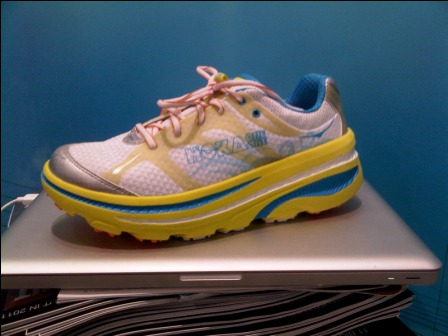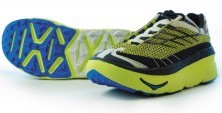 The Hoka One One movement is still rolling down the hill. These trail running shoes are the antithesis of minimalist trail running shoes, they’re the antimalist (I just trademarked that term). Hoka One One was invented by Nicolas Mermoud and Jean Luc Diard of France, who had previously worked at Salomon, so they do know something about running shoes. From an adventure race in Sicily was born a love for running over mountains and on trails. Nicolas and Jean wanted a trail running shoe that allowed them to fly downhills even if they were heel striking, again, the antithesis of minimalist trail running.
The Hoka One One movement is still rolling down the hill. These trail running shoes are the antithesis of minimalist trail running shoes, they’re the antimalist (I just trademarked that term). Hoka One One was invented by Nicolas Mermoud and Jean Luc Diard of France, who had previously worked at Salomon, so they do know something about running shoes. From an adventure race in Sicily was born a love for running over mountains and on trails. Nicolas and Jean wanted a trail running shoe that allowed them to fly downhills even if they were heel striking, again, the antithesis of minimalist trail running.
The Hoka One One soles are 2.5 times larger than traditional trail running shoes which makes them look a bit like Jimmy’s strength shoes from Seinfeld. Hoka claims the foam gives a 30% softer ride (how do you measure and quantify softness of a ride?) and is able to dissipate 80% of the impact of a heel strike. Even though the shoes look bulky, they are relatively light, 15% lighter than traditional trail running shoes.
With the success of their initial release Hoka One One has set two new versions of trail runners to be released in February: the Combo XT and the Bondi B. The Combo XT is a hybrid running shoe intended for roads and on trails. Hoka One One says they developed the Combo XT because they have been seeing a rise in runners who want a shoe that is adaptable for both surfaces. The Bondi B is named after the beach in Sydney, Australia, which also happens to be the place I saw real life boobs for the first time, just thought I’d share that. The Bondi B has a reduced level of cushioning by about 10%. It has an oversized outsole to improve responsiveness on hard surfaces and is lighter for road running. The rocker sole seems more pronounced in the Bondi B than previous Hoka One One trail runners; however, the lugs are less pronounced which gives it more of a road running feel.
The Hoka One One shoes have a 13 cm rocking profile at the toe which provides a spring in your step when running on flat or uphill terrain. The low ramps angle also allow for tremendous confidence running downhill, engaging the gluteus and lower back, as opposed to isolating the quads like traditional downhill trail running. The bottom of the shoe has 50% more surface area so you run straight over rocks and roots without feeling anything or changing your stride. Like a mountain bike barreling down a hill, rolling over every obstacle in its path rather than avoiding them. The Hoka One One was invented so trail runners could run fast over any surface and any terrain.
Check out the newest improvements in the evolution of the Hoka One One trail running shoes and let us know what you think. Could this be another new movement in running shoes in the opposite direction of minimalist?
